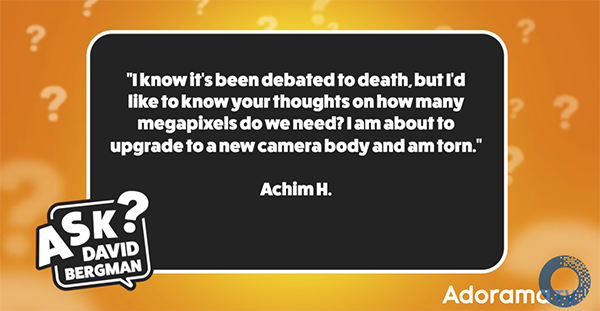How Many Megapixels Do You Need & How Many Are Too Much? (VIDEO)
The two questions in the headline above have been debated for years, and the queries keep coming as new high-res cameras continue to be introduced with no apparent slowdown in sight. There’s no one correct answer to either question, because it all depends upon the type of photos you shoot, how you typically use them, and a number of other key considerations.
There are several very helpful guidelines for those anticipating the purchase of a new camera, as you’ll see in this 13-minute video from the Adorama TV YouTube channel. This revealing discussion was prompted by a question posted on the Ask David Bergman website where anyone can pose a common topic and often receive an answer by this highly acclaimed NY-based photographer.
In this episode Bergman applies his 30 years of experience to take a deep dive on this subject, tackling everything one needs to know about resolution, image quality, display characteristics, and much more. Keep in mind that your specific genre of photography factors into the equation—be it landscapes, portraiture, action sports, or something else.
Another key consideration has to do with the ultimate use of your work. Do you make oversized prints for display, submit images for publication, or just share them online via social media platforms? Bergman begins with an overview of the concept of megapixels and how they affect a photo. He then applies the above criteria to provide suggestions for choosing a camera with a level of resolution that best suits your needs.

Bergman also explains why a super hi-res camera may be the wrong choice for a variety of reasons, even if you’re not worried about cost. Maybe your computer isn’t sufficiently powerful to handle huge image files, and/or you don’t want to invest in the high-capacity storage devices required for backing up this type of work.
Another pertinent issue involve how you typically frame up your shots; namely, whether you prefer to crop in the camera or shoot “loose” and do your cropping during post processing. And what about low-light performance and other essential factors that affect image-quality?
Bergman also discusses the ramifications and necessary resolution for optimum print quality in various sizes, whether you output imagery on a home printer or order prints from a local lab or through an online service bureau.
As you can see, a lot goes into answering the questions posed at the onset, and it’s important to resist the temptation to follow the trend toward super high-res cameras unless that’s really what you need. What you want is a totally different matter and may not serve you well.
There are many more thought-provoking videos on the popular Adorama TV YouTube channel. And feel free to visit the Ask David Bergman website and post questions of your own.




